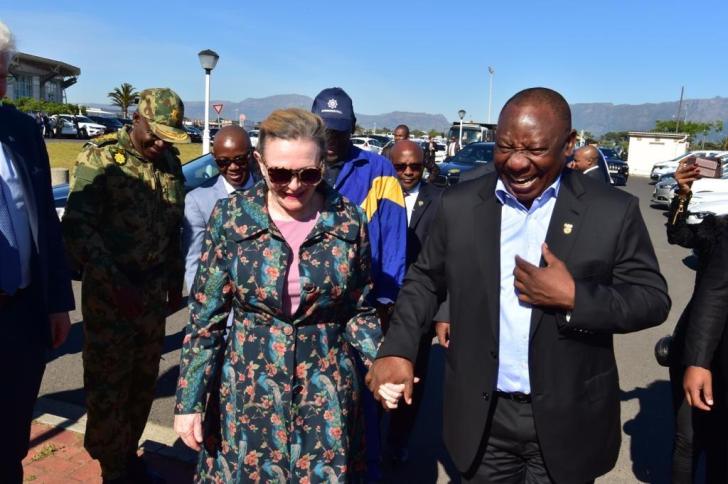News / National
Ramaphosa's 'super' Presidency slammed
25 Jul 2024 at 06:31hrs |
0 Views

Various political parties represented in Parliament have slammed President Cyril Ramaphosa for creating a super presidency concentrated in his office.
This week, uMkhonto weSizwe Party Parliament Leader Dr John Hlophe accused Ramaphosa of escaping accountability by not creating an oversight committee to hold his office accountable, which now consists of three ministers reporting directly to him.
During his sixth administration, Ramaphosa had four ministers reporting to him, with his seventh administration, under the Government of National Unity (GNU) Cabinet, having decreased this number to three after the Ministry of Electricity and Energy was made a standalone ministry.
However, complaints still continue as the number of deputy ministers has increased.
During his debate in Parliament, Dr Hlophe said this was not sustainable as there was no portfolio committee to hold these ministries, which include state security Minister in the Presidency Khumbudzo Ntshavheni, Minister in the Presidency for Women, Youth, and Persons With Disabilities, and Minister in the Presidency for Planning, Monitoring and State-owned Enterprises.
"There has never been a portfolio committee that has been established for the Presidency. That is a serious lacuna. We do not have a portfolio committee that has been established for the presidency as yet. With the dissolution of the Department of Public Enterprises, state-owned companies now fall under the Presidency, which means they will no longer be accountable to Parliament.
"The president only answers to Parliament during quarterly question-and-answer sessions, which are often marred by bias, which means they will no longer be accountable to Parliament. Can we trust Ramaphosa to manage these companies without Parliamentary oversight?" Dr Hlophe said.
Echoing Dr Hlophe's concerns was Rise Mzansi leader Songezo Zibi who said over the years, the size and scope of the Presidency has expanded significantly.
"However, Mr President, the growth of the Presidency has not been matched by efforts to ensure that the many issues that previously fell to ministries continue to be subject to Parliamentary oversight. This situation must not continue.
"At the heart of South Africans' despair about our democracy is the sense that government leaders are not accountable. There is no one more obligated to set an example than you, Mr President, by working with Parliament to create an appropriate mechanism for this body to provide oversight over this work," he said.
Last year, following his Cabinet reshuffle and the appointment of Minister of Electricity Kgosientso Ramokgopa, the President was slammed for having used his powers to establish a "super" Presidency occupied by those allegedly close to him to monitor projects he wanted to keep his eye on, including energy and state security.
This week, uMkhonto weSizwe Party Parliament Leader Dr John Hlophe accused Ramaphosa of escaping accountability by not creating an oversight committee to hold his office accountable, which now consists of three ministers reporting directly to him.
During his sixth administration, Ramaphosa had four ministers reporting to him, with his seventh administration, under the Government of National Unity (GNU) Cabinet, having decreased this number to three after the Ministry of Electricity and Energy was made a standalone ministry.
However, complaints still continue as the number of deputy ministers has increased.
During his debate in Parliament, Dr Hlophe said this was not sustainable as there was no portfolio committee to hold these ministries, which include state security Minister in the Presidency Khumbudzo Ntshavheni, Minister in the Presidency for Women, Youth, and Persons With Disabilities, and Minister in the Presidency for Planning, Monitoring and State-owned Enterprises.
"There has never been a portfolio committee that has been established for the Presidency. That is a serious lacuna. We do not have a portfolio committee that has been established for the presidency as yet. With the dissolution of the Department of Public Enterprises, state-owned companies now fall under the Presidency, which means they will no longer be accountable to Parliament.
"The president only answers to Parliament during quarterly question-and-answer sessions, which are often marred by bias, which means they will no longer be accountable to Parliament. Can we trust Ramaphosa to manage these companies without Parliamentary oversight?" Dr Hlophe said.
Echoing Dr Hlophe's concerns was Rise Mzansi leader Songezo Zibi who said over the years, the size and scope of the Presidency has expanded significantly.
"However, Mr President, the growth of the Presidency has not been matched by efforts to ensure that the many issues that previously fell to ministries continue to be subject to Parliamentary oversight. This situation must not continue.
"At the heart of South Africans' despair about our democracy is the sense that government leaders are not accountable. There is no one more obligated to set an example than you, Mr President, by working with Parliament to create an appropriate mechanism for this body to provide oversight over this work," he said.
Last year, following his Cabinet reshuffle and the appointment of Minister of Electricity Kgosientso Ramokgopa, the President was slammed for having used his powers to establish a "super" Presidency occupied by those allegedly close to him to monitor projects he wanted to keep his eye on, including energy and state security.
Source - The Star
Join the discussion
Loading comments…


































